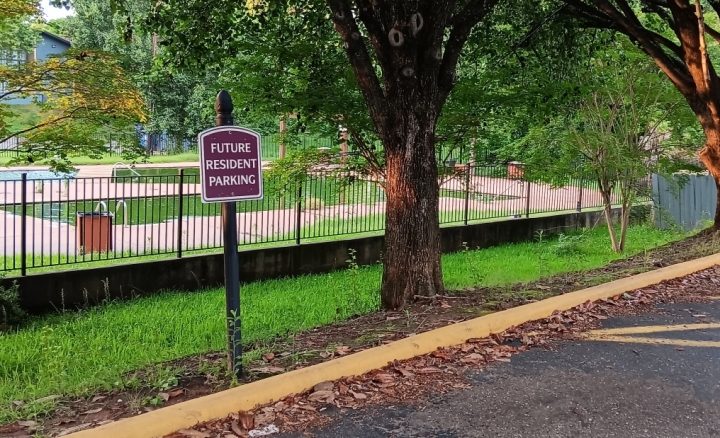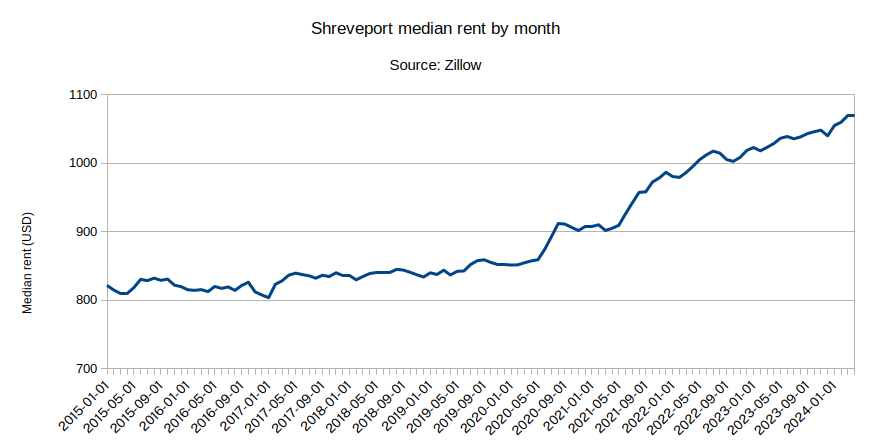Jolie Apartments and the Wider Housing Crisis
5 June 2024

The Jolie apartment complex in Shreveport had its power and water shut off on May 31st, before all residents had left. The complex had been plagued by mismanagement and had become a target for political action by the municipal government. Mayor Arceneaux has accused its owner of being a slumlord after the ownership of the complex fled the state and ceased paying water and electricity bills.
Besides rent-paying tenants, the complex was also home to a large population of squatters. We were told by residents that squatters had begun moving in as tenants began to leave, with squatters breaking the locks on apartments as they became vacant, and then simply changing the locks on the doors with equipment they could obtain down the street from Walmart.
We visited the Jolie apartments several times, noting no generalized chaos during any visit. People walked around and sat outside while children played. At one point, people were relaxing under the shade around the pool area (the pool itself was empty except for dark green water). People kept to themselves. Few were open to talking to us. Before we were able to interview anyone, local media had made it on the scene in the hopes of getting tenants to provide negative opinions of the squatter. While the apartment’s management and local television news stations have proffered a narrative that lays blame on the squatters for the complex’s decay, the residents we spoke to did not attribute the complex’s problems to anyone who is squatting. Both men, seniors in their mid-60s, had been residents for several years, and had witnessed the deterioration of living standards firsthand.
According to one man, who requested to remain anonymous, issues had begun over two years ago, after the property was sold and management changed at least four different times. Managerial turnover was high and frequent, and successive apartment managers failed to keep up with repairs because of restrictions placed on them by ownership. Our anonymous interviewee explained that maintenance crews had to get parts from Lowe’s and Home Depot rather than receive supplies through a contractor. For at least a six month period over a year, the apartments stopped receiving mail as the mail boxes were frequently being broken into, with tenants being told to pick it up straight from the post office, until the post office said they would no longer hold it for tenants.
The other man, Glen Garrett, 67, told us that each change in management was worse than the last, with repairs becoming less frequent, dumpsters no longer being emptied, and the landscape allowed to overgrow, until eventually services ceased altogether. Glen noted that because he continued paying rent and had to shoulder the cost of required apartment maintenance on his own, he had fewer financial resources available during his moving process, where he had to hire outside help and rent a moving van, while the ownership continued to accrue payments from tenants.
As the complex fell into disrepair, some long-time residents helped to make repairs on their own initiative with what limited resources they had. After tenants in one building noticed they no longer received hot water, a volunteer maintenance worker (also a tenant) discovered that someone had stolen the copper pipes and wiring in the unit’s boiler system.
Neither men we spoke to blamed the squatters for that instance of theft. One man alleged that people have come from outside of the apartment complex to take advantage of the situation. Car thefts, for example, have been blamed on people who live outside of the complex, who know that the security situation in the complex is minimal, stealing cars by loading them onto trailers at night (means that are plainly unavailable to someone who can’t afford rent). Car theft rings have proliferated in Shreveport since 2022; police resources are already stretched thin, and both distressed tenants and squatters make for easy victims (especially squatters, who often cannot go to the police without sacrificing their living situation or facing criminal penalties for squatting).
Both men laid the blame for the deterioration of the complex on its ownership, which reneged on the contract it signed with tenants, even as tenants continued to hold up their own end by paying their rent. Glenn informed us that management had changed at least four times, with each successive managerial regime being worse than the last. He also suggested that either management or ownership had abetted the deterioration of the apartment complex by tolerating or perhaps profiting from drug trafficking that was readily apparent from the constant flow of outside traffic through the complex. While opinion on the squatters was mixed, both men noted that as the community of tenants worked together to help one another through the crisis, squatters were included.
When asked what they thought the city should do, our anonymous interviewee said “they should go after the property owner’s money.” Glenn echoed the sentiment, and said the city should provide restitution for tenants through the prosecution of the ownership. “Laws had to have been broken. I don’t think this should happen without justice being served. It’s unjust.”
It’s unclear who even owns the complex. Mayor Arceneaux, in an interview with KSLA, alluded to the obscurity of the ownership. “I don’t know off the top of my head who owns the Jolie Apartments, it’s either a corporation or a limited liability company, but they are being totally irresponsible and unresponsive.”
**
The speed with which the situation at the Jolie apartments has deteriorated does not bode well for Shreveport’s overall housing situation. A few days before we conducted our interviews, there was a shooting at the complex. The day after we conducted our interviews, one of the buildings at the complex burned down, followed by another fire a few days later.
While squatters have been blamed for the fires, squatting itself is an outcome of the inadequacy of existing institutions in providing housing. In our case, that institution is the housing market. Very few people become squatters willingly, but the housing market in Shreveport has made many people into squatters by necessity. Rents in Shreveport have risen considerably over the last decade, with the median rent rising from about $820 a month just under ten years ago to $1069 today. With investments made by big companies like Amazon and G-Unit Studios in the city, and real estate developers looking for opportunities to gentrify poorer neighborhoods, this increase in rents is likely to continue.

The fact that the city has done anything at all to help tenants is somewhat of a surprise. Mayor Arceneaux, a Shreveport Republican, has been leading a fight in Government Plaza against the city’s slumlords, but this fight has been carried out in accordance with the interests of Shreveport’s property owning elite, especially its petit-bourgeois homeowners and landlords. Demolishing “slums” without expanding public housing will only reduce the housing stock, and, all else being equal, increase competition for housing among tenants and buyers, resulting in higher rents and higher home prices.
Tenants, and squatters, will have to respond to this politically if there’s any hope of things changing course. A political response would mean not only advancing pro-tenant, anti-landlord, candidates in elections who can fight for public housing, but also the creation of tenant unions which can halt evictions, collectively bargain with landlords, and carry out rent strikes, resisting arbitrary rent increases thereby.
While adequate housing is considered a human right, the steady rise in the cost of housing throughout the US has increased the burden of providing housing for oneself and one’s family, swelling the ranks of the homeless and those living in precarious housing situations. This is a problem that will only get worse until political power can be wielded by the working class against those who profit from this situation: the home-owning gentry, who have a material stake in the never-ending increase in home values, and landlords, who see an increased rate in personal enrichment the more they charge working people for rent. Class struggle on the part of tenants against landlords, and on the political plane for the radical expansion of public housing, is the only strategy that can abate the rise in housing costs and solve the US’s housing crisis.